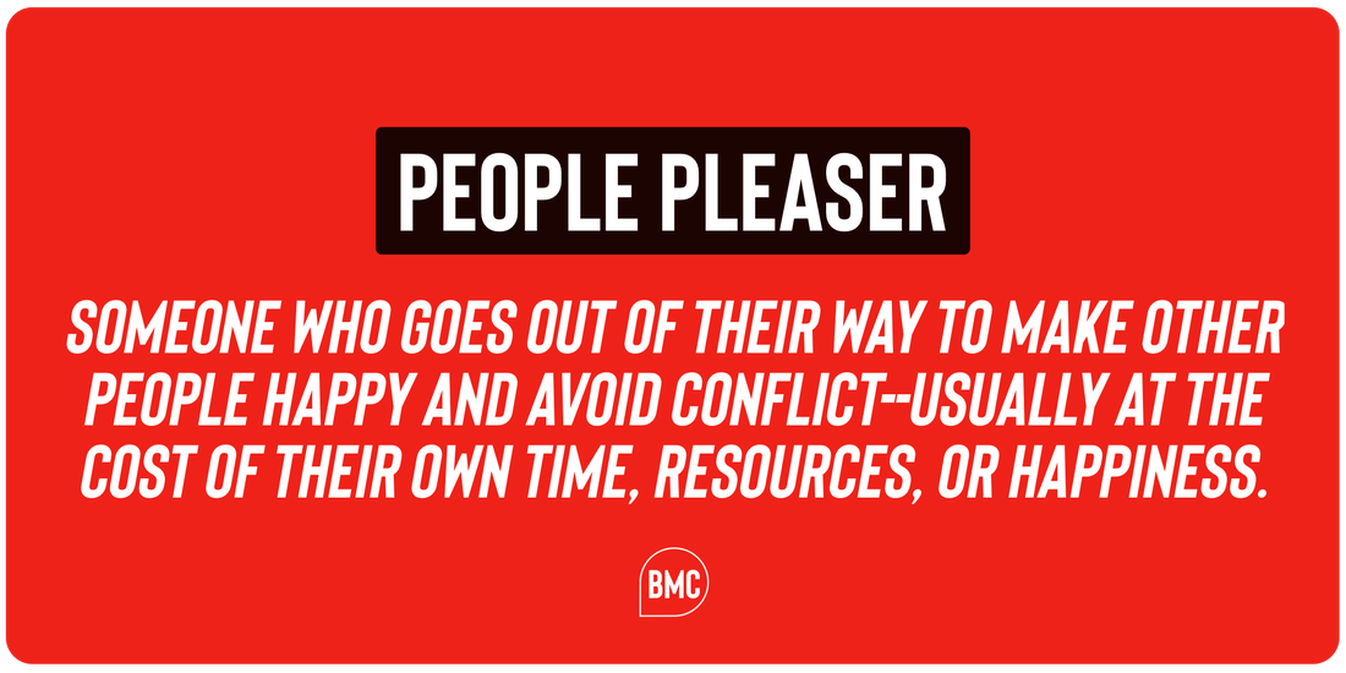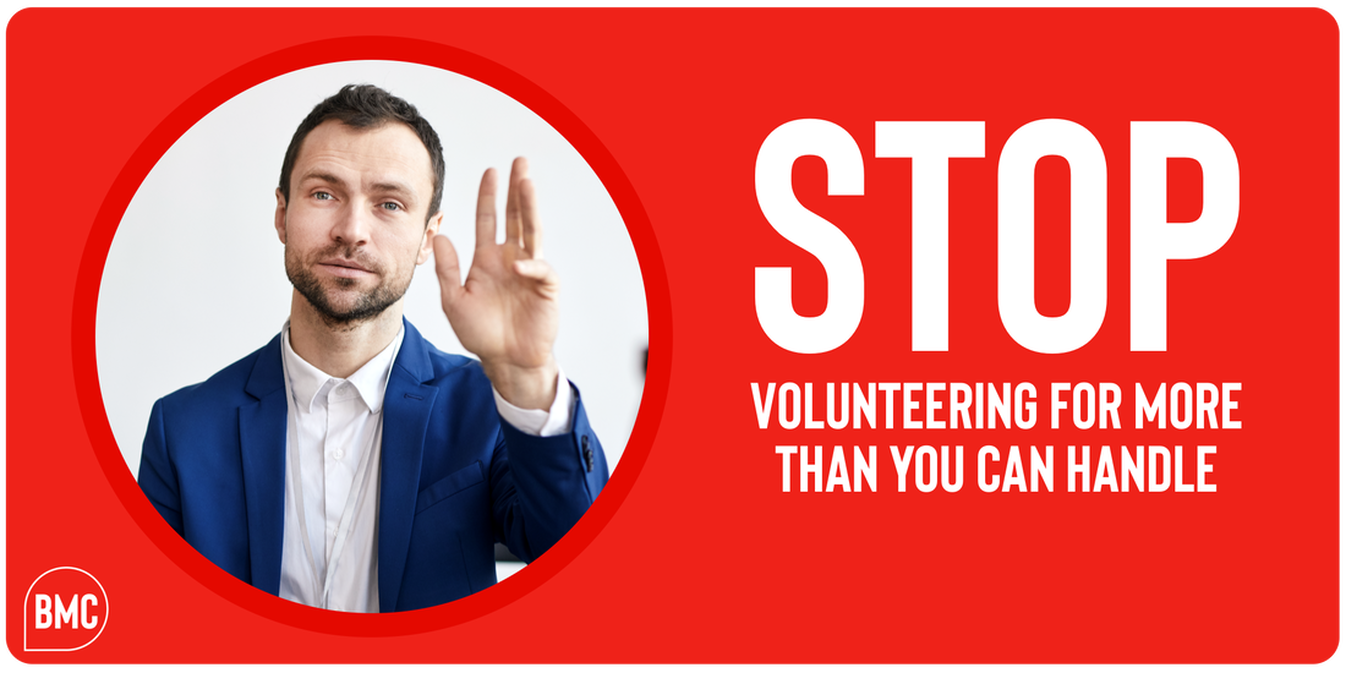There is nothing wrong with being nice.
Doing things for people who need help, being considerate, being generous--these are all traits to be admired.
However, there is a very fine line between being “nice” and being a people pleaser.
So how can you tell the difference?
For starters, being a do-gooder comes with feelings of joy and satisfaction--like when you volunteer at a soup kitchen or help an elderly woman carry her groceries to the car.
Chronic people pleasing can look similar on the outside (helping a coworker catch up on a project for instance) but comes with feelings of resentment and overwhelm--usually followed by guilt for feeling that way.
These negative feelings are caused by burnout. People pleasers tend to overcommit to others and say yes at their own expense.
For many of us (yes, I’m a recovering people pleaser as well!), this burnout and resentment become a vicious cycle that can harm our relationships and reduce our quality of life.
In this article, we’re going to discuss how to identify people pleasing tendencies and how to stop them.
You can still be a good person, but you won’t get stuck doing stuff you don’t want to do because you’re afraid of what other people will think of you.
No more...
- Blowing up your Friday by picking your friend from the airport in rush hour traffic.
- Helping your coworker's sister (that you've never met) move.
- Babysitting your friend’s “I swear he’s really nice” dog.
Once you stop people pleasing, you’ll be amazed by the sense of relief and clarity. Your relationships will improve, you'll make more genuine friendships and your self-esteem will grow as you learn to stand up for yourself in a way that is confident, tactful, and kind.
When you stop people pleasing, you know that you're doing whatever you want because YOU want to, not so that others will approve of you.
In this article, you’ll learn…
- What a people pleaser is
- How to tell if you have people pleasing tendencies
- The consequences of people pleasing
- How to stop being a people pleaser and start setting boundaries
First...What Is a People Pleaser?

Let’s look at a people pleaser definition: A people pleaser is someone who goes out of their way to make other people happy and avoid conflict--usually at the cost of their own time, resources, or happiness.
Instead of coming from a place of confidence and genuine desire to help, people pleasing tendencies often stem from insecurity and a lack of self-esteem.
Sometimes we people please to avoid conflict.
More often, we people please for the validation we receive in return. It’s a way to feel useful and needed.
Signs That You Might Be a People Pleaser
People pleasing, like any personality habit, can pop-up in your life in many ways.
Perfectionism, being overly concerned with the opinions of others, overcommitting, refusing compliments--all can be signs of people pleasing tendencies.
Here are a few very common signs that you might be a people pleaser. If more than a few of these apply to you, keep reading for our tips on how to recover!
- You say yes to outings and parties you’re not really interested in
- You apologize for things that aren’t your fault
- You find it difficult to form or voice your own opinions
- You say “maybe” instead of no
- You’re easily peer pressured
- You feel deep anxiety when people are mad at you
- You laugh at jokes you don’t understand or find funny
- You offer to help others even when you’re already overwhelmed
- You feel responsible for the emotions of others (coworkers, significant others, friends, family, etc.)
If any--or all!--of these symptoms sound familiar, you might be a people pleaser.
The Hidden Cost Of People Pleasing
I mentioned above that people pleasing can have negative side effects for you and your relationships. Let’s dive a little deeper into that.
The Yes Reflex
For most chronic people pleasers, saying yes is a reflex. The reason this happens is actually incredibly scientific.
When we say yes, people are happy. They praise us and say “Thank you so much!”
This lights up the reward center of our brain and delivers doses of dopamine (happy chemical) and oxytocin (social bonding hormone) straight to the pleasure centers of our brains.
This is an evolutionary response designed to encourage much needed social bonding and encourage cooperation. The more cooperative we are, the easier it is for the species to survive.
However, just like any feel-good chemical, we can get addicted to the rush. We start saying “yes” to everything for the warm glow we get from being “that guy”. Simply put, we become a junkie for that sweet quick hit of positive attention and gratitude.
Time to pull out the needle!
The downside of saying yes? We don’t always have the time, resources, or knowhow to get the job done. This results in overwhelm, resentment, and a job not well done.
Working From a Place of Fear
Chronic people pleasing can also come from a place of fear. Fear of abandonment, fear of rejection, fear of conflict…
And it makes sense! Keep people happy, do things for them, and they’ll like you.
Right?
You’d think so.
But in reality, working from a place of fear and insecurity is always counterproductive.
Because people can feel when your intentions aren’t genuine or when there’s reluctance and resentment behind your “yes”. And that recognition plants seeds of doubt and guilt.
For example, imagine that you asked somebody if they could water your plants for a week while you’re out of town. And instead of saying yes or no, they sighed heavily and said “Maybe… I’m so busy right now. But you know what, yeah. I can totally do that for you”
Now you have a plant-sitter, but you feel weirdly guilty about it! You’ve been put in a position where it’s been made clear that you’re imposing. You wish they would have just said no instead.
Guilt trips and martyrdom often go hand in hand with people pleasing, whether it’s intentional or not.
And that can do serious damage to your relationships with the people around you.
How To Stop People Pleasing And Set Strong Boundaries
1. Start With “People Pleasing Lite”
If people pleasing is an addiction, this method is like a nicotine patch.

Eventually, it’s important that you get to a place where you can either give an enthusiastic yes or an honest and tactful no”
But saying no is a muscle that you have to build. And the two pound dumb-bell version of saying no is “Let me check and get back to you.”
“Let me check and get back to you,” is a phrase that gives you the space to examine your own desire and ability to do the thing being asked of you without having to say no immediately.
We call this a “Soft No” in the biz.
A soft no forces a delay while you get comfortable with the idea of actually saying no. Luckily, most people understand instinctively that these phrases are often a precursor to “no,” so it helps let them down a little easier.
Other examples of soft no’s are:
- “I’d like to help, but let me check my schedule.”
- “Wow, that sounds fun! Let me check with my significant other first though.”
- “I’d like to, but I’m not sure what my schedule looks like that far in advance.”
- “I want to help you out. Can I get back to you in [X hours, days] about it?”
Please note that this is NOT a cure for your people pleasing. It’s a baby step in the right while you build confidence.
Don’t get too comfortable here. You don’t want to end up being the flake who always answers “Maybe” on Facebook invitations and then doesn’t show up.
IMPORTANT NOTE:
Also note that you must get back to people with your no eventually. It is deeply inconsiderate to leave people in limbo. And be honest about your reasons.
I promise that it’s better to be the upfront guy who says “Sorry, man, I’m just totally exhausted. But I’ll catch you up next time!”
People understand and respond to honesty and genuine human experiences. Making up excuses or hedging to avoid conflict just makes you look shady.
2. Have a Decline Script Ready

We all know that practice makes perfect. So write down a few ways to say no in various situations and then use those scripts in low stakes situations.
For instance, if your friend is organizing an outing and you’re burned out from a busy week, say no to the invite. They’re inviting other people so you’re not cancelling a good time, and they’re already your friend so they’re not going to be upset with you for saying no to one event.
Worried about what to say? Here are a few sample scripts to get you started:
- “That sounds so fun! Normally, I’d love to, but I can’t because I’m just completely wiped out after this week. I’m going to pass this time, but invite me to the next one!”
- “Thanks for thinking of me! But I can’t because I’m exhausted from work this week and I just really need some downtime. Have fun!”
- “I appreciate the invite, but I think I need to do some self-care this weekend and hang out with my [spouse/pet/kids/plants/couch/Netflix]. I’m totally there next time!”
Framework of a great decline script:
- Thank them for asking.
- Decline whatever they want you to do. Pro tip: Use the word because. Why? Because studies have shown that using “because” will increase compliance.
- Let the silence do the work. (More on this later in the article!)
You’ll be SHOCKED how well other people take it.
It’s actually a really humbling (and freeing!) reminder that no one thinks about you as much as you do.
Everyone understands what it feels like to need a break. And, ironically, we’re all much more willing to give other people that break that we are to give it to ourselves.
3. Prepare for Pushback

Now, so far, we’ve worked on the assumption of understanding and compassion. And, generally speaking, that’s what you’re going to get when you say no.
However, there will be times that you experience some pushback. Some people try to take advantage consciously, while others are just less sensitive to other people’s emotions. But either way, your response should be the same.
- Explanation (not excuses)
- Firm reiteration
And that’s it!
Rephrase as needed until they get the message.
Just remember that honesty (explanation, not excuses!) rings true and people always appreciate transparency. This is not a negotiation, you are setting reasonable boundaries.
Here’s an example of how that might go with a friend:
- Friend: “Hey, want to go see this movie?”
- You: “No thanks! I’m really tired.”
- Friend: “Aw, come on, man! Movies are low energy and I’ve been dying to see it.”
- You: “I love hanging out, but I can’t because it’s been a really long week. I need to recharge and be alone. Thanks though!”
You explained your position and reiterated your no.
Most people will drop it here.
If you have a particularly stubborn or oblivious friend you make have to restate your stance a few more times. Just keep repeating yourself until they understand.
Here’s an example of how this might go at work:
- Coworker: “Hey, I’m really swamped this week, could you help me finish this project?”
- You: “Sorry, but I can’t. I’m really swamped too.”
- Coworker: “I really need the help though. There’s no way this will be finished on time, and the boss will be upset with the whole department!”
- You: “I’d like to help, but then I won’t be able to hit my own deadlines. I have to focus on my responsibilities before I take on anymore.”
ADVANCED MOVES:
Sometimes it will feel like there is no way to say no, no matter how overwhelmed you are.
For instance, when you have a demanding or unreasonable boss. This is an advanced form of boundary setting because your boss has the power in this situation.
But you have the power to set reasonable boundaries for yourself in any situation.
For example:
- Boss: “Hey I need this task done immediately.”
- You: “That sounds urgent. Would you like it to take precedence over the [project/task/duty] I’m performing now?”
- Boss: “No, I need both to be turned in on time.”
- You: “Since that won’t be possible without a significant decline in quality, please let me know which project you’d like me to complete first. I want to make sure I’m prioritizing what’s most important to you and the company.”
This is next-level stuff because it encourages the boss to choose what to prioritize.
Also: If your boundaries are repeatedly being violated or your boss is not able to respond reasonably and calmly, it might be time to look for a new position.
4. Let Silence Do the Work

It’s natural to want to soften the blow and over-explain after you say no.
But this often leaves room for people to argue or try to wear you down.
Instead of giving people paragraphs about why you can’t do something, say no in one sentence and let silence do the rest.
“I’m sorry, but I can’t do that.”
…
…..
…....
............
Phew!
Talk about cringing. As a recovering people pleaser myself, that almost hurt to type.
But sometimes, as the song says, you must be cruel to be kind.
You cannot leave the door open for people to misunderstand or disrespect your boundaries.
The more you try to explain, the worse people feel and then everything gets awkward.
Instead, when the answer is, no, just say no. The silence after will back up your resolution and they’ll say “Oh, okay! No problem!” and go ask someone else 99.999% of the time.
(It may help to re-frame that silence as “I’m giving them the space to process the no.”)
5. Don’t Leave the Door Open!

Don’t leave the door open for people when you’re setting boundaries or they will step over the threshold.
It’s completely natural to try to soften the blow of a firm no.
But when you say things like “I can’t...this time” or “Not right now”, you’re leaving room for negotiation.
And this is not a negotiation, IT IS A BOUNDARY.
If you find yourself clinging to conditional phrases, refer to step four and keep your mouth shut after you say no. Put your fingertip against your mouth if you have to. Step away from the keyboard for a minute and re-read your response to make sure there are no loopholes.
Whatever you have to do to draw a clear and indisputable line in the sand, DO IT.
No negotiating.
No compromise.
Just firm and kind expressions of your boundaries.
It’s gonna suck. It’s going to be hard as hell, especially when it’s someone you’re close to.
But you cannot leave the door open, or you will start the cycle of people pleasing all over again and hate yourself for it.
6. Get Clear About Your Values

An important part of setting boundaries is understanding what your values are.
What is and isn’t acceptable to you?
In order to set reasonable and helpful boundaries, you have to understand what you’re trying to protect.
- What gives you energy?
- What saps your energy?
- What makes you feel bad?
- When do you feel most content?
- What do you want out of your relationships?
- What makes you feel resentful or overwhelmed?
By answering these questions, you’ll find exactly where your boundaries need to be.
It’s very helpful to write down your values and the answers to these questions so you can refer back to them when you’re struggling to keep your boundaries.
And you may find that your answers evolve over time, so come back to these questions every year and check in with yourself.
7. Stop Volunteering for More than You Can Handle

80% is the new 100%!
That sounds weird, especially for people who are used to giving that much praised 110%.
But if you’re always working at 100% for other people, you’re not leaving room for error--or for rest.
One of the most destructive symptoms of people pleasing is burnout.
When you say yes to EVERYTHING without leaving time for self-care, you will burn out.
Imagine that you’re a pitcher of water.
When your friend wants to hang out, that’s a glass you need to fill.
When you’re assigned a new project at work, that’s a glass you need to fill. As you take on more glasses, there’s less and less water to distribute among the glasses you have to fill.
And, eventually, you will run out of water completely. Then you’re empty, the glasses are empty, and everyone is thirsty and cranky.
That’s burnout.
To avoid burnout, you have to refill your pitcher before it is empty. You can do that by playing with your dog, taking a nap, working out, cooking, listening to music, playing video games--whatever you do to relax and invest in yourself.
People pleasers tend to feel guilty about focusing on themselves. And it can actually be easier to focus on others when you’ve never taken the time to figure out what you want and like to do.
We get so used to the feeling of burnout that we assume it’s normal. But it’s not, and it shouldn’t have to be!
That’s why it’s vital to find a sense of balance and reduce the number of glasses you have to fill.
8. Give Yourself Permission to Disappoint People

If you’re a people pleaser, reading that headline probably made you a little anxious.
I get it. Nobody wants to let their friends or coworkers down. Everyone wants to be the hero and the helper.
But you’re not responsible for other people’s feelings. You can only control your own actions. And sometimes, in order to help others, we have to help ourselves first.
Ever been on a plane? Remember when the flight attendant said “Put on your OWN oxygen mask first”?
Same concept! Just like the pitcher metaphor above, you cannot care for others if you are not caring for yourself. So set boundaries and stick to them.
Good people will respect your boundaries. You should never settle for less.
Action Steps: How to Stop People Pleasing
- Write down some “people pleasing lite” scripts
- Come up with 1-3 decline scripts for common situation where you need to say no
- Determine your values
- Practice saying no
- Stop volunteering for more responsibilities or activities until you have a handle on your true availability
- Evaluate how you feel after saying no and congratulate yourself!
Next Step:
Want more tips on how to improve your people skills?
Click here and I'll start you off with my free 56-minute audio guide on joining and enjoying group conversations. (As well as Q&A videos, podcasts, and much more!)
In the audio guide, you’ll learn…
- How to jump into a conversation that has no opening
- Genuinely Connect With Anyone About Any Topic
- How To Get Out Of Your Head And Stay Present In Group Conversations
- And more (word-for-word scripts, body language while joining a group, etc)
3 ways I can help you level up your communication skills:
1. Private Coaching: I’m the secret weapon top Performers at Google, Netflix, and the US Army trust for people skills coaching. Imagine what I can do for you.
2. Social Accelerator: Social Accelerator is my proven self-paced + group coaching system for turning social awkwardness into confidence, overthinking into action, and hesitation into meaningful connections.
3. My group convos audio guide. Join over 5,000 overthinkers who have supercharged their group conversation skills using tested strategies in my 56-minute audio training.

I'm Jeff Callahan
I make it nearly impossible for overthinkers to fail at improving their people skills. (I've helped hundreds of people over the last 10 years)
Want to never run out of things to say in conversation again so you connect with more people and make new friends?
Want to speak up more in important meetings at work so you get promoted faster and have an awesome career?
Want to develop unshakeable social confidence and competence so you can walk into any room and feel like you belong there?
As your coach, I'll help you move forward faster.



















